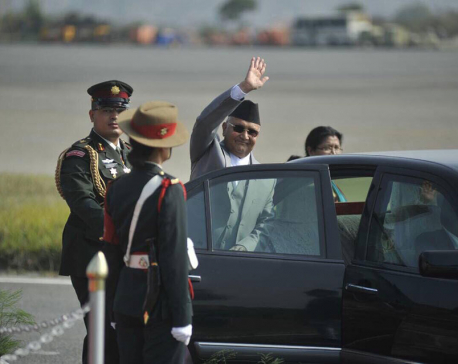
OR
Here is what the Clean Feed Policy is missing
Published On: November 3, 2020 02:39 PM NPT By: Dhruba Sharma

The Clean Feed legislation was thought off largely from the perspective and viewpoint of emancipating Nepali advertising industry. It was seen as a way to bring in more money to Nepali advertisers.
But what happens to the entire TV signal distribution chain - the MSOs and the Local Cable Operators who have sunk billions into providing TV signals? After all, we also need the television industry to survive. The Nepali TV broadcasters saw an opportunity of increased advertising money, but what happens to the people who distribute the signals? And why is it important to understand our pain, especially when we have happily cooperated with the decision? Instead of calculating the real or imagined gains to the advertising industry, it is also important to honestly analyze if the law-abiding TV distribution industry will even survive.
Do we, as honest taxpayers, have the right to exist and operate our business on equal footing?
With 120 or more FTA channels that are popularly viewed, having gone missing from Nepal's TVs, it is no rocket science to calculate that our revenues and subscriber base will both take a dive. Second, if we try to get more content, then our costs will increase. Will the consumers pay more for a hugely reduced content? It might have been OK if the advertising industry and the local broadcasters had borne the cost of distribution, but this is unworkable because the TV distribution business losses are nowhere among anyone's list of priorities.
All along, in light of these changes, we have been asking for a level playing field and equality before the law. Policy making should be such that lawful businesses that give steady revenue and pay their taxes should not be sacrificed to help businesses that blatantly break many rules and commit legal offences with impunity.
I will cite a few cases of copyright laws, censorship laws, downlink policy and foreign exchange and tax losses. One can add anti-competitive offences to this list.
Is any cinema hall authorized to show an uncensored or pornographic film? Or is any TV channel allowed to do that? Can anyone play any pirated content on TV or in a cinema hall?
Who allows these things on the internet when the copyright and censorship laws of Nepal do not allow such content in magazines, cinemas, TV or radio? That is a serious breach of law that deserves to be treated as such. The Internet is no sacrosanct ground permitted to break laws where others cannot.
It is a well documented fact that countries that pioneered and allowed the proliferation of pornographic video content are themselves suffering from the drastic social side effects of the Internet. Nepal's recent Covid lockdown showed a massive spike in rape rates, and that is disturbing since it paralleled increased internet use.
I received calls from a leading OTT operator of Nepal when I raised the issue of illegal OTT apps; it was alleged that I was trying to push Nepal into the stone age. By providing blatant pornography on every phone, the unregulated internet providers are the ones who are not only breaking the law, but are also pushing Nepal's traditional family values into danger. With ever rising divorce rates, export of our women for prostitution, unwed pregnancies, increasing rapes and breakdown of family values - it is the abuse of the internet for illegal purposes that is pushing Nepal into the stone age.
No one is bothered because the internet is such a profitable business.
I have nothing against any business, but the government has to have a uniform application of the law. If pornography is an offence, it is an offence no matter where it is shown. What is the sense in having a trillion rules for TV, radio, magazines, newspapers when the internet is allowed to break these rules every passing second with impunity? Why are we more concerned about having downlink licences for TV channels reaching around three million households and not worried at all about 20 million mobile and other devices that show video content without any permissions/downlink licences, propriety, accountability, copyright or censorship norms?
The law is the same for everyone but not in practice. That is what is wrong and needs to be fixed without delay. Countries like China and India have already shown their political will in clamping down on whatever they considered as threats to their national interest. There is no Google in China and there is no TikTok in India. Most importantly, there is no data protection in Nepal as all international operators steal personal data from Nepal with impunity despite our privacy law.
The advertising policy is supposed to get rid of all foreign advertising, whether it is on a website or on Facebook, Instagram, YouTube or OTT/Mobile apps. The Clean Feed Policy is not limited to TV alone. Nor is the deadline applicable to TV, if the authorities desire to act in the spirit of fair play and justice. Why does this simple fact need the creation of the advertising board, when it is already implemented for TV? If the downlink policy is enough grounds to bring Clean Feed on TV, then why does it not apply to the internet?
The Internet serves porn, breaks copyright and censorship laws by serving illegal content through torrents/ YouTube every single passing second. Stop them or grant everyone the same freedom.
Why is there no downlink policy for the Internet-based video content? Why is there no ad-blocking on YouTube or Facebook?
Why don't we have a law forcing Google and Facebook not to serve foreign ads in Nepal. Internet users are numbering in millions and TV users are a dying few thousands. Why are then, our policies, hell bent on fattening the law breakers and killing the honest taxpayers who are dying?
Not only that, the Internet-based OTT apps like Netflix, Amazon, Hotstar, Sony Liv, Boot, Zee5, Alt Balaji are taking money from Nepal without paying taxes here and beaming unlawful content without any downlink permissions. It is true that Nepali people who use the diaspora network to transfer funds are also to blame, but the government should also have been proactive in restricting unlawful and unregistered businesses. There should be a legal framework in place and then the businesses should be conducted lawfully.
And the larger question of taxes never paid by Google and Facebook in Nepal is being sorely missed?
I would like to point out that all the blocked channels are available on mobile through OTT and other apps/websites. All mobiles can play the same so-called blocked and banned content on their TVs. So people not getting to see IPL on their TVs are simply switching to illegal OTT apps on the phone. It's a breach of the law, it's also a flight of foreign exchange and a tax loss.
The entire bogey of the Internet crimes is looming large because of the fallacious assumption that the Internet is uncontrollable. But this thinking is wrong. On the one hand we are choking the TV industry in terms of content and promoting its downfall, there is an alternate reality that needs to be understood. International online giants are investing in Nepal-based internet providers. Nobody is asking why?
Let me illustrate this by example. If any international brand wants to target Nepali customers, they can easily do so by targeting Nepal with any international ad on their mobiles/tablets/laptops. What happens to Clean Feed Policy then? And these companies are not legally registered here, nor are they paying any taxes but simply treating us as profit centres. What will it take for us to understand this simple fact?
I call on the stakeholders to take care of all these legal breaches and create a level and legal playing field for all businesses. Again, is asking for the law to be uniform too much?
The author is president of Nepal Cable Television Byabasahi MahaSangh
You May Like This

Aug 21: 6 things to know by 6 PM
Your daily dose of missed important news of the day. ... Read More...

What Nepal needs is India's friendship and support for growth: Nepal PM Oli
In an exclusive interview to The Hindu, Mr. Oli says the bitterness of past relations have been put behind them,... Read More...

Helping women re-envision a better Nepal: Women LEAD Nepal
KATHMANDU,March 7: Women LEAD Nepal started as an idea that women and girls could change the trajectory of Nepal’s future and... Read More...





Just In
- MoHP cautions docs working in govt hospitals not to work in private ones
- Over 400,000 tourists visited Mustang by road last year
- 19 hydropower projects to be showcased at investment summit
- Global oil and gold prices surge as Israel retaliates against Iran
- Sajha Yatayat cancels CEO appointment process for lack of candidates
- Govt padlocks Nepal Scouts’ property illegally occupied by NC lawmaker Deepak Khadka
- FWEAN meets with President Paudel to solicit support for women entrepreneurship
- Koshi provincial assembly passes resolution motion calling for special session by majority votes







_20220508065243.jpg)






Leave A Comment